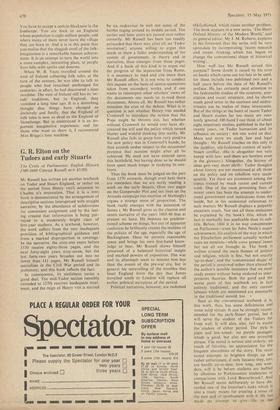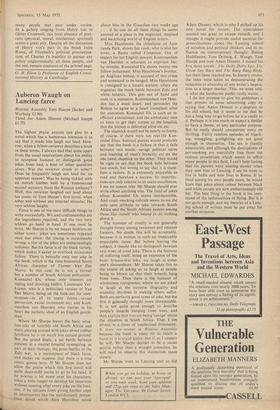G. R. Elton on the Tudors and early Stuarts •
The Crisis of Parliaments: English History 1509-1660 Conrad Russell OUP £3.00)
Mr Russell has written yet another textbook on Tudor and Stuart England, or rather on the period from Henry yin's accession to Charles les restoration. That it is a text- book is demonstrated by the arrangement of descriptive sections interspersed with straight narrative, by the abundance of subdivisions for convenient assignment and by the feel- ing created that information is being pur- veyed to a moderately bright class of first-year students. As a textbook, however, the work suffers from the very • inadequate provision of bibliographical guidance and from a marked disproportion in coverage. In the narrative, the sixty-one years before 1570 receive eighty-three pages, and the next forty-eight years sixty-seven, but the last forty-two years broaden out into no fewer than 111 pages. Mr Russell himself specialises in the Civil War period and its prehistory, and this book reflects the fact.
In consequence, its usefulness varies a good deal. The mid-Tudor section (sensibly extended to 1570) receives inadequate treat- ment, and the reign of Henry Wit is marred
by an endeavour to sort out some of the battles raging around its middle period. The earlier and later years are passed over rather cursorily. Mr Russell has been too readily persuaded that there was, after all, no 'Tudor revolution'; anyone willing to argue this needs to show a fuller understanding of the system of government, in theory and in operation, than emerges from these pages. And if a book of this kind is to argue out the progress of the separation from Rome, it is necessary to read and cite more than Mr Russell offers. It is not wise to conduct this inquest on the basis of source-quotations taken from secondary works, and if one wants to reinterpret other scholars' views of the documents one needs to re-read those documents. Above all, Mr Russell has rather mistaken the crux of the debate. What is in question is not whether Henry vitt needed Cromwell to introduce the notion that the. Pope might be thrown out, but whether without Cromwell he would ever have dis- covered the will and the policy which turned bluster and wishful thinking into reality. Mr Russell also fails to grasp how very positive the new policy was in Cromwell's hands; he thus accords undue respect to the occasional pretence that reunion might after all be achieved. He need not have entered upon this battlefield, but having done so he should have spent much longer in studying its con- tours.
Thus the book must be judged on the part from 1570 onwards, though even here there are reminders that we are really reading a work on the early Stuarts. Over two pages on the Gunpowder Plot and ten lines on the Armada campaign (no mention of Mattingly) argues a strange sense of proportion. The book really emerges with the accession of James 1. Mr Russell gives us the clearest and sanest narrative of the years 1603-40 that at present we have. He imposes no predeter- mined scheme on things, but out of apparent confusion he brilliantly creates the realities of the politics of the age, especially the age of Buckingham. Once he permits reasonable space and brings his own first-hand know- ledge to bear, Mr Russell shows himself possessed of a balanced historical insight and marked powers of exposition. The war and its aftermath seem to interest him less than the events of the pre-war era, but in general his unravelling of the troubles that beset England from the day that James travelled south to London will replace all earlier political narratives of the period.
Political narratives, however, are reckoned old-fashioned, which raises another problem. The book appears in a new series, 'The Short Oxford History of the Modern World,' and its general editor, Mr J. M. Roberts, explains in his foreword that the series will be very up-to-date by incorporating 'recent research and recent thinking which has begun to change the conventional shape of historical writing'.
Now well • has Mr Russell served this purpose? Some doubt is raised by his note on books which came out too late to be used, for these include two published two and a half years before the date of Mr Russell's preface. He has certainly paid attention to the fashionable studies of the economy, pop- ulation and social structure, and he shows much good sense in the cautious and undoc- trinaire use he makes of these intoxicants. But of the things at the heart of recent Tudor and Stuart studies far too many are reso- lutely ignored. Off-hand I can think of about eight important studies, published in the last twenty years, on Tudor humanism and its influence on society : not one word on that. More and more we study law and legal thought : Mr Russell touches on this only in the familiar, old-fashioned context of early- Stuart conflict. (He is altogether not very happy with law; and. there are-howlers even in the glossary.) Altogether, the history of ideas gets very short shrift: Tudor thoughts about history are not mentioned at all, those on the polity and on rebellion very inade- quately. Yet these are prominent among the topics treated by much recent and current work. One of the most promising lines of recent years has been the attempt to under- stand government and institutions, from the inside, but in his occasional references to such matters Mr Russell displays a.palpably uncertain touch. Nor can all these omissions be explained by the book's title, which in fact is markedly less applicable than its sub- title. Before 1604 it in no way concentrates on Parliament—even Sir John Neale's major achievement, his analysis of the way in which the Elizabethan parliament actually worked, rates no mention—while some general issues but not all are brought in. The book is written around the main themes of politics and religion, which is fine, but not exactly `up-to-date'; and the 'conventional shape' of the period is preserved rather than altered by the author's sensible insistence that we must study events without being enslaved to inter- pretative theories. Both the good and the worse parts of this textbook are in fact entirely traditional, and the only current labours which are mentioned are essentially in the traditional mould, too. •
Seen as the conventional textbook it is, this work, thus, has some deficiencies and some solid virtues. It can be strongly recom- mended for the early-Stuart period, but it will serve the student of the Tudors far from well. It will also, alas, fail to excite the student of either period. The style is plain and low-toned: no purple passages, which is good, but also not one arresting phrase. The mood is serious and orderly; no touch of frivolity, no appreciation for the frequent absurdities of the story. The occa- sional attempts to brighten things up are rather unfortunate, if only because they, too, are hardly up-to-date; how long, one won- ders, will it be before students are baffled by allusions to Parkinsonian tendencies or comparisons with Lord Beaverbrook? And Mr Russell seems deliberately to have dis- carded one of the historian's tasks which is also a ready means for creating a sense of the past and of involvement with it. He has made no attempt to give life to the many people that pass under review. In a gallery ranging from Henry viii to Oliver Cromwell, this total absence of port- raits (physical, moral, intellectual, spiritual) seems a great pity. Despite all the discussion of Henry vat's part in the break from Rome, of Elizabeth's political procrastina- tion, of Charles I's inability to pursue any policy singlemindedly, all these people, and the rest, remain creatures of the printed page.
G. R. Elton is Professor of English Consti- tutional History at Cambridge







































 Previous page
Previous page